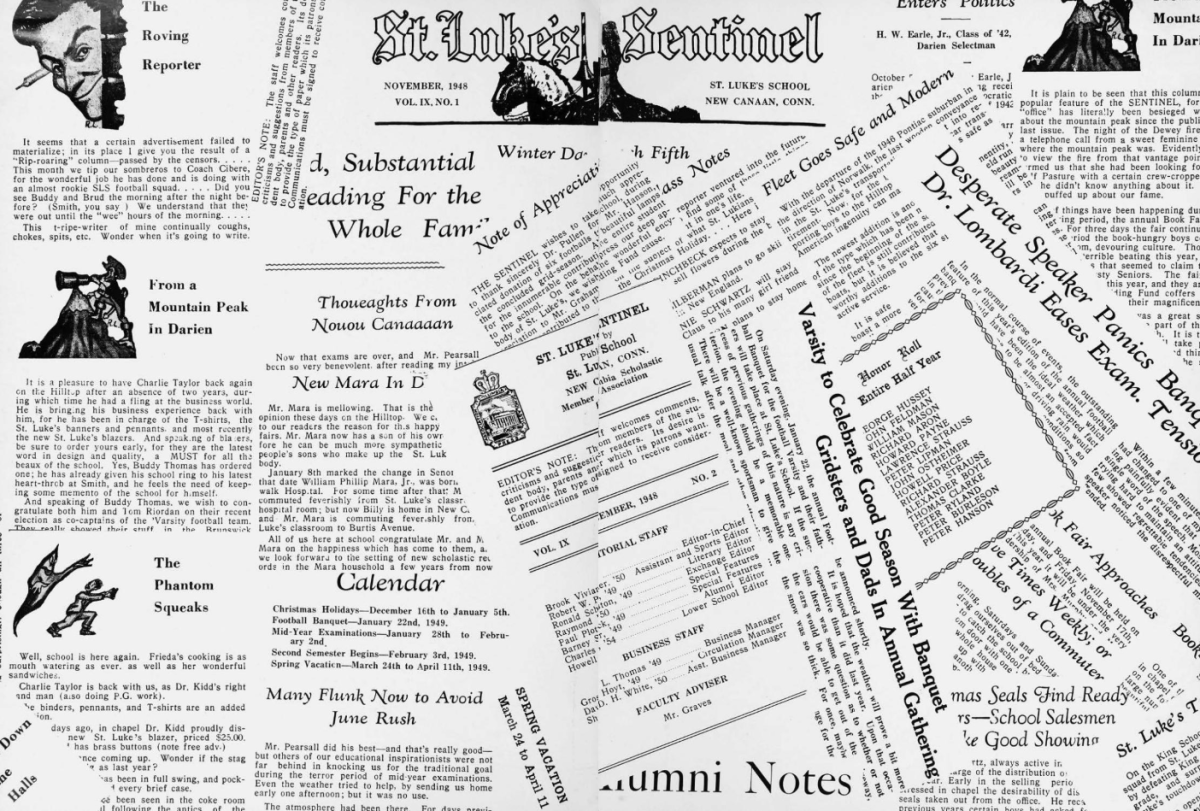This past spring, I interviewed the managers of winter season varsity sports to learn more about their experience and what it means to be a manager. I was pleasantly surprised to learn how much fun the managers have but also how much work and dedication goes into the job. This year, I decided to interview some seniors who managed fall sports. I spoke to Patrick Regan ‘24, manager of Boys Varsity Soccer; Charlie Lukens ‘24, manager of Girls Varsity Field Hockey; Sebastian Rosario ‘24 and Sally Picon ‘24, senior managers of Varsity Football; and Atara Loewenberg ‘24, manager of Girls Varsity Soccer. Their stories are different, inspiring, and full of good times and growth.
What motivated you to become a manager?
Patrick Regan ‘24: “To win the chipper and be a good influence for young boys.”
Charlie Lukens ‘24: “After departing my other sports, I wanted to be a part of a team again, so I decided to become the manager of Field Hockey, and I’m so glad I did.”
Sebastian Rosario ‘24: “My brother was a part of the football team when he went to SLS and he got really close with Mr. Thomas. Because of that, Mr. Thomas got close with my family, so I already knew him. When I was a freshman, my friends Myles and Abby were already managers, and I would go help them sometimes after school, so Coach Thomas asked me if I wanted to become a manager.”
Sally Picon ‘24: “I wanted to be a manager because I really like the community that was SLS football and also because I really love sports, and I wanted to get involved in a way without playing sports. Also, I might want to work in sports, so it’s a great way to learn more.”
Atara Loewenberg ‘24: “I used to play soccer and, to be honest, I didn’t think I was that good, but I loved the team and coaches, so I thought being the manager could be a good happy medium.”
What is your favorite part of the job?
Regan: “I’m just giddy at the thought of one more pre-game bench conversation with Oliver Samardzija ‘26 and mid-game conversation with Lucas Krauss ‘27 and Alex Hill ‘27.”
Lukens: “One of my favorite parts is definitely the laughs; it’s all just really funny. Me and Reese have a lot of laughs together – it’s been a time. I love being part of this really fun team because I’ve been able to get to know so many awesome people.”
Rosario: “Definitely our conversations. Having conversations with other managers and connecting with them and being a part of the team in that way is really great. You get to know the players and coaches, and that’s important because managers are the ones behind the scenes trying to support everyone.”
Picon: “Being on the sidelines. Being close to players during the game is so fun. Even though winning didn’t really happen often, it was great that one time.”
Loewenberg: “I like the fact that I get to organize; I like to organize and plan events. Also, at least on the soccer team, they do a really good job of making me feel like part of the team. That starts with the coaches, and the players do the same.”
Tell me about some of your duties and contributions to the team. How are they special?
Regan: “I was given the opportunity to take stats and do the film for the team, an integral part of how every player strives to improve their game.”
Sofia Staikos ‘24 on behalf of Lukens: “He would make us laugh…He would take videos of us having fun all the time; when he showed up to practice, he was very engaged. Without him doing his duties, we wouldn’t have been able to do drills and be ready for games.”
Rosario: “We bring equipment and water out. We make Gatorade, fix players’ helmets, charge batteries, and make sure headsets are good to go.”
Picon: “We deal with the coaches, the clock…we set up the field before games. We do film sometimes. Our duties are special in that no one really knows how much we do.”
Loewenberg: “My duties are mostly planning, so I make the equipment calendar, I write the weekly email with the coaches; I also make sure the balls are pumped, I bring the rosters on game day. The little things go a long way. They’re crucial things. We would be missing a lot of stuff if I didn’t bring them to the game with me. Little responsibilities pile up into big things that I have to fulfill to make sure we don’t have any issues. My fun duty is getting to hang out with coaches on the sidelines. Ms. Garnett and I have had a lot of fun times chatting with each other, and I can tell her about my day.”
Looking back, what was a very stressful moment for you while managing your team? How did you handle it?
Regan: “When we were up 2-0 against Hopkins and then we blew the lead. I had to call my girlfriend and tell her again because she didn’t believe me. Group hugs and Triscuits got us through it.”
Lukens: “During the Sacred Heart game we were losing by a bit, 8-0 to be exact, when we made the decision to win with our hearts, go out with a bang, and overcome this adversity with laughter and good times; I contributed to the laughter.”
Rosario: “Originally, the team did not work well together. There was no communication–we had a new coach, new players; everything felt different…but we just had to figure out a way where we could all be able to respect each other. There was a lot of disrespect in the beginning.”
Picon: “I talked to my other manager friends. Because we were all feeling the same way, it was easier to get through the stress.”
Loewenberg: “We’ve had a lot of stressful moments – most come during games. There were a lot of super close, competitive games in playoffs, which we made both years that I’ve been on the team. It’s definitely a tough time for everyone, and I’m a huge supporter on the sidelines. I’m the first to stand up and cheer.”
What advice would you give to a St. Lucian wanting to get into the management of a team?
Regan: “Do it!”
Lukens: “My advice is to go into it with an open mind because you don’t know how it may turn out. I did it to fill the sports requirement for my sophomore year and ended up loving it and have done it ever since!”
Rosario: “Don’t let people’s words bring you down just because you’re not a player on the team. You’re still part of the team. Let your voice be heard, and don’t hide in the shadows. Shout out to Ms. Nicole and Ms. Anna–they always have our backs.”
Picon: “I’ll say do it; be a manager, especially if you want to be part of a team but don’t want to be an athlete.”
Loewenberg: “I would definitely recommend it, especially if it’s a sport you enjoy watching. It’s a great time, and I think the coaches do an amazing job making you part of a team. If you’re looking to make more friends but don’t want to play or you’re not that good, it’s a good way to get in and have that camaraderie. It’s also not too overwhelming; Dan said without me on game days we would be such a mess.”
Being a manager at St. Luke’s seems like a perfect way to join in on the team spirit without the pressures of being an athlete if you want a season off or aren’t inclined athletically. This year’s senior fall sport managers seem to have a great gauge on their team spirit and where they are most needed, exemplifying the possibilities for growth with their team and the good times shared.








![iStock. (n.d.). Anonymous business partners making handshake in shadow [Photograph].](https://digitalsentinel.org/wp-content/uploads/2025/04/Screenshot-2025-04-16-at-3.42.57 PM.png)






